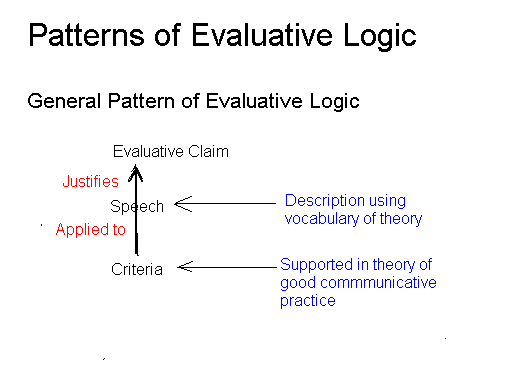
Expectations are that students who fully understand rhetorical viewpoints are able to use their knowledge to evaluate discourse. This page is intended to explain and illustrate evaluation in criticism.
Evaluation is the most sophisticated of activities for the critic:
| Definition | Illustration from Clinton Health Care Town Hall Meeting | |
| Description | Tells us what is in the discourse | "Clinton responded to the question by explaining how employers could not diminish insurance coverage after his program had been adopted." |
| Interpretation | Use a vocabulary to provide insights into how a communication works. | "Clinton defines this feature of his plan using comparison: you cannot be worse off under his plan than you are now. Since his purpose is showing the superiority of his plan, this comparison makes the superiority part of the definition of the plan." |
| Evaluation | Makes a judgment about the discourse informed by the interpretation and supported by the description. | "This strategy is high in identifiability because the comparison makes the judgment quickly: You cannot be worse off. It is an ambiguous position, but a strong one for his purposes since it leads to a judgment in favor of his plan." |
Note the description is easily generated through observation without any special vocabulary. The interpretation employs the terminology learned (in italics) to focus on particular aspects of the rhetorical act. The evaluation uses the evaluative criteria (underlined) to make a judgment on the discourse.
Wayne Brockriede ("Rhetorical Criticism as Argument." Quarterly Journal of Speech 60 (1974): 165-74) explains that good critical work moves up a scale of sophistication (from top to bottom below):
| Definition | Illustrated in Clinton's Health Care Town Hall Meeting | |
| From description | tells us what is in the communication | "Clinton answered the woman's challenge on abortion by explaining how abortion was provided now." |
| Beyond classification | applies a label using a vocaulary; thus "Look, here is an example of definition by detail" | "This is definition by comparison to which he adds a strategy of detail." |
| To inference | tells us something we did not know before we used the vocabulary | "The abortion issue potentially trims support for his plan. [a claim that would need to be justified in your audience analysis.] By employing a strategy of detail, Clinton leaves an ambiguous answer to the initial probe thus minimizing the damage to the support for his plan." |
Good critical work achieves inference and thus uses the vocabulary to advance our knowledge.
There are a number of different logical strategies for supporting an evaluative claim:

This logic uses analysis to develop an ideal communication message for the situation, and then compares the actual message to that ideal.

This is a post-hoc analysis of the discoursive situation used once you have determined the effectiveness of the communication
